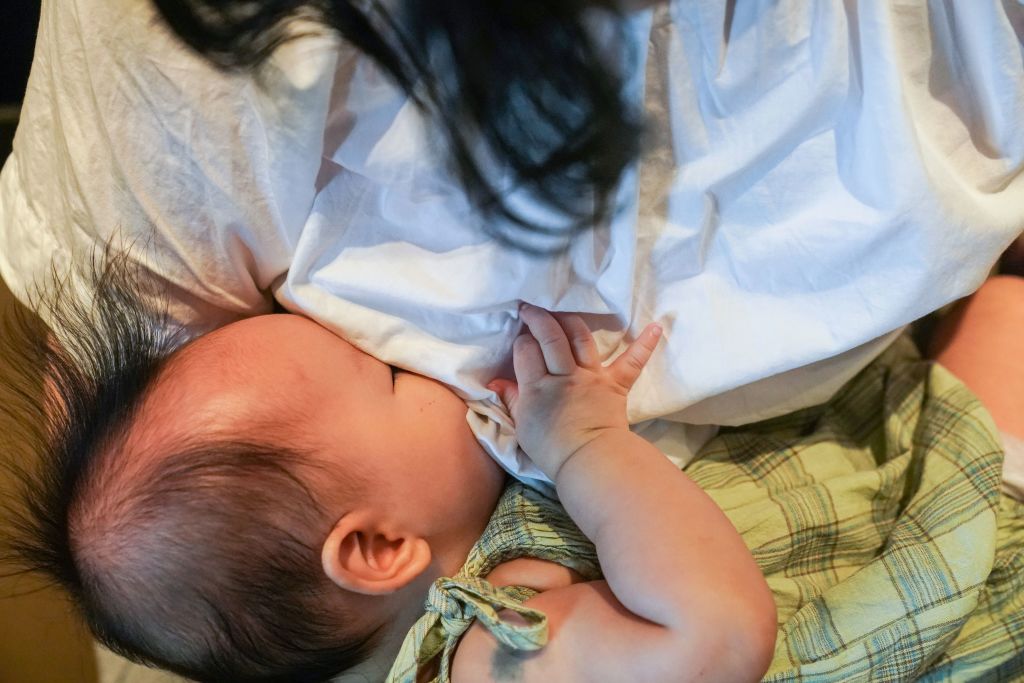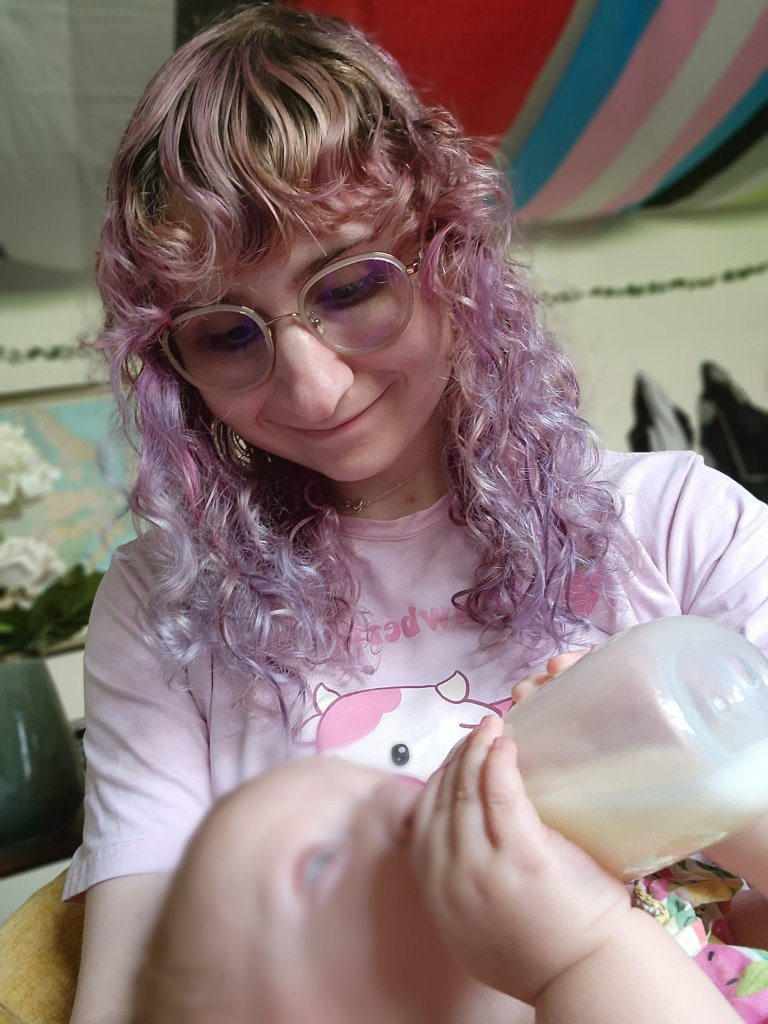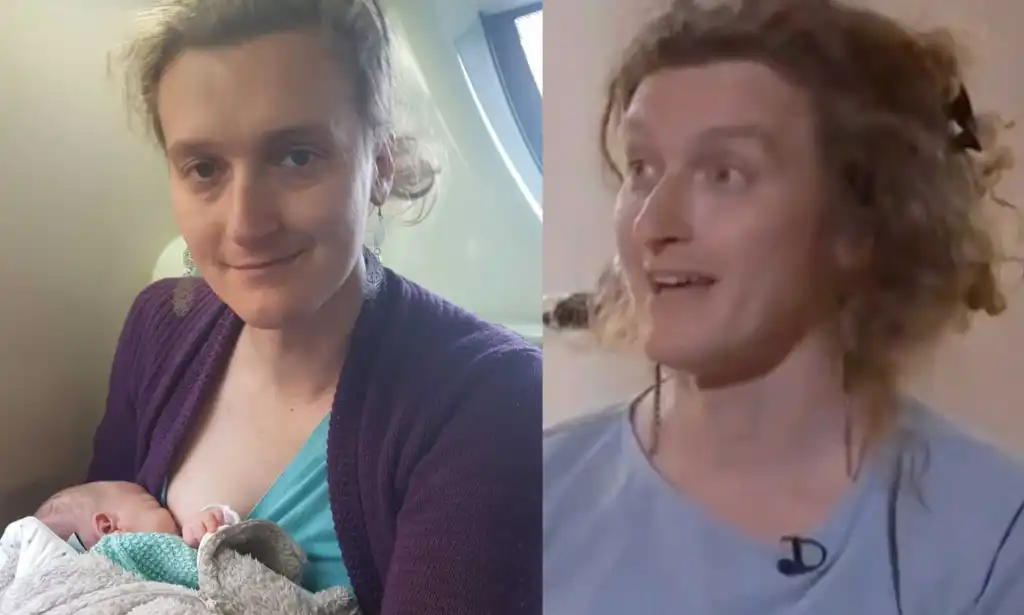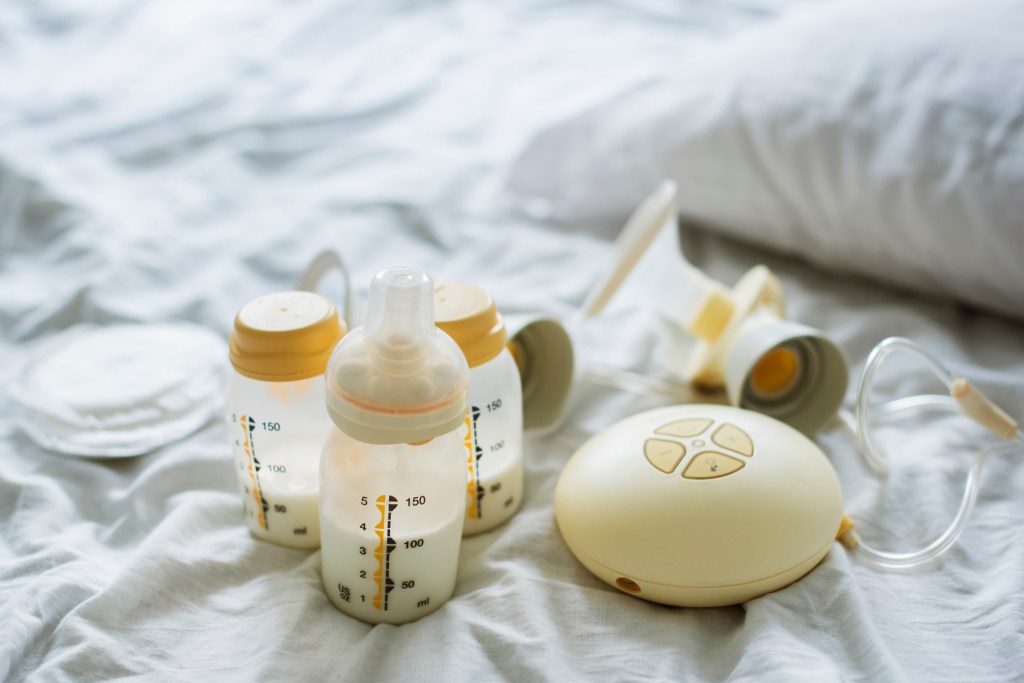Yes, trans women can breastfeed too. Here’s why it’s good for both mum and baby

[ad_1]
Yes, trans women can breastfeed – and research shows it’s perfectly healthy and safe for both mother and baby.
Most people assume that only cisgender women can breastfeed, but a combination of medical research and anecdotal evidence prove this is not the case.
In fact, we know that trans women can successfully breastfeed their children – and that the milk they produce can, at the very least, be just as nutritious as that produced by the birthing parent.
In 2018, the medical journal Transgender Health published a case study that detailed how a trans woman living in New York was able to induce lactation using a “basic framework” established by previous researchers.
In order to breastfeed, the woman’s dosage of an oestrogen steroid hormone called oestradiol was increased, as was her dosage of another hormone called progesterone. She was also given a galactagogue – medication designed to boost lactation supply – to increase her prolactin levels.
Finally, the woman was told to use a breast pump before her partner gave birth, to help increase her level of prolactin, a hormone made by the pituitary gland which helps breasts grow and create milk.
The woman’s story made headlines across the world because of the success of her treatment. Three months after starting her regimen of medication, she was able to produce eight ounces – approximately 236mm – of breast milk each day.

She went on to exclusively breastfeed her baby for six weeks. Her paediatrician reported that the child’s “growth, feeding and bowel habits were developmentally appropriate” during that time.
After six weeks, the woman began supplementing her breastfeeding with formula out of concern that she wasn’t producing a high enough volume of milk.
Trans women’s breast milk is shown to be healthy and nutritious
While that study proved what many trans women and other non-birthing parents already knew – that they are physically able to breastfeed – it didn’t give an in-depth insight into the nutritional make-up of the woman’s milk.
However, a paper by Amy K Weimer, published in the May issue of Journal of Human Lactation, focused on that.
Much like the 2018 study, Weimer’s research featured a single case study, this time of a 46-year-old trans woman who wanted to find out if she could “support her partner during the early postpartum months” by helping out with breastfeeding.
In the months leading up to the birth of their child, the woman underwent a similar treatment regimen to that detailed in the earlier study. After the baby was born, she found she was able to produce around 150mm of breast milk per day over five pumping sessions. Two weeks after the birth, she started breastfeeding once or twice a day “with good success” while a bottle of her pumped milk was also occasionally offered.

For her paper, Weimer also performed an analysis on four samples of breast milk the woman had produced, to better understand its nutritional qualities. She found that the milk “showed values of protein, fat, lactose and calorie content at or above those of standard-term milk”.
The woman at the centre of the study was also able to attest to the extraordinary impact breastfeeding had on her relationship with her child. The paper reported she found it to be both “emotionally fulfilling” and “pragmatic” to be able to help her partner with breastfeeding responsibilities.
“I continue to feel heartened that I was able to do this for baby and have such a connection with her during her earliest days. It’s something that so many women do and definitely felt special to me,” the woman said.
While the study found that the milk was as nutritionally robust as any other woman’s, there was one downside: the quantity she produced was lower than what would be needed “to sustain infant growth independently”.
The study noted that this was “at least in part due to less frequent complete breastfeeding sessions for this individual, constantly below commonly recommended frequencies of at least six to eight times daily to establish and maintain robust milk production”.
In this couple’s case, it didn’t matter because there were two parents breastfeeding, which meant they could still provide easily enough milk for the baby.
Weimer wrote that “relatively low volume of milk production was also noted in the two prior published case reports of lactation induction in transgender women”. However, there could be “other contributing factors” behind that, she said.
Trans women have spoken about their breastfeeding journey
More research is needed to fully understand the complexities of breastfeeding or chestfeeding for trans and gender-diverse people. However, while would-be parents wait for the science to catch up with what’s already happening on the ground, there’s plenty of anecdotal evidence that could help trans people better understand how they can breastfeed their children.
One of the most vocal advocates for trans people breastfeeding is the Twitch streamer known online as Nominal Naomi. The PhD student and mother of three often speaks about her own experience of breastfeeding on social media, and she’s been on the receiving end of child-protection complaints and an endless stream of abuse for doing so.
Speaking to PinkNews, Naomi says she and her fiancée, who already has children from a previous marriage, decided that Naomi would be better placed to breastfeed their children as she had a more flexible schedule.
“My fiancée wasn’t really able to keep up a supply of milk, both due to some troubles with her body as well as working late nights at the hospital, so there was no time for her to keep an established supply,” Naomi says.
“But I have a very flexible schedule with my work as a researcher, so I was able to essentially produce the milk our child was on. It ended up working out really well and had been something that I always wanted to do as a mother.”
Before starting, Naomi did a deep dive into the medical research. After learning it was possible for her to lactate, she worked with a primary-care physician and a paediatrician to figure out a medication regimen that would enable her to establish and maintain a supply of breast milk.
Being able to nourish her child was a life-changing and powerfully affirming experience.
“It’s made me feel close to my child in such a way that’s so motherly,” she says. “It’s natural and it feels so right to be able to provide for my child in that kind of way.”
Trans women face hostility for breastfeeding their children
When Naomi decided to open up about her own breastfeeding experience, she could never have guessed how much abuse she would face. Some of the backlash has left her feeling scared.

“I’ve had people threaten to attack me in public. There was one person who tried to dox me and tried to file a report with child protective services in a state that I didn’t live in.
“It’s just scary that people would actually try to hurt me just because I want to provide for my kid.”
It hasn’t always been easy, but Naomi wants trans people to know that parenthood can be a part of their life if that’s what they want. That’s why she’s determined to keep speaking out.
“If you’re trans, you can be a mother. You can be a father. You can be a parent. You can actually have a family and this life – this dream is possible for you, and you can even breastfeed your kids,” she says.
“The only thing that’s stopping you is other people’s hate and vitriol, and I don’t want to let that get in the way of me loving my family as best I can.”
Naomi isn’t the only trans person who has faced a backlash over her decision to breastfeed. In the UK, a trans woman called Mika Minio-Paluello faced a deluge of rage on social media after she appeared on an ITV News report on the cost of water bills.
Labour MP Rosie Duffield even singled her out, writing on X – formerly known as Twitter – that she is “not a struggling ‘mother’ [because] biological men cannot carry a baby or give birth”.

Much like Naomi, Minio-Paluello was later reported to the National Society for the Prevention of Cruelty to Children, who concluded that there was no safeguarding risk.
Cleo Madeleine is a spokesperson for Gendered Intelligence, a UK-based charity that works to increase understandings of gender diversity and improve the quality of life of trans people. She worries that society is regressing when it comes to attitudes towards LGBTQ+ parents, and the backlash to trans women breastfeeding is part of that.
“Fundamentally, all parents should be involved in the nurturing and raising of their children regardless of gender identity. It’s the year 2023, we quite happily teach our children that families come in a diverse range of shapes and sizes, and that’s not just to talk about queer parents but also to talk about single parents, about surrogacy, about found family, about adoption.
“It’s really important that we accept that not every family looks like one woman, who breastfeeds and does the nurturing of the child, and one man, seemingly unrelated in all of this.”
Madeleine points out that it isn’t that long since Section 28 was in place in England, under which queer people were written out of existence in schools.
“I hate to think we’re heading back toward that kind of time,” she says. “We should be embracing the fact that we have such a range of ways of raising children and bringing them up in this world.”
Trans parents should ignore other people’s judgments
Marianne Oakes, a trans therapist who runs her own practice in addition to her work with GenderGP, says the anti-trans backlash is having an effect on transgender people who might be thinking about starting a family. Her advice is simple: think about what’s right for you and your family, and don’t be afraid to shut out the rest of the world.

“The first thing I would say to any trans person is you’re doing no different than anybody else would do, that your need to give sustenance to your new-born baby is equal [to] and [as] valid [as] anybody else’s,” Oakes says.
“If there’s a way you are able to feed the best milk that your baby can get, that is equal to anybody else’s, then don’t feel you need to apologise. You’re being the best parent you can be – and don’t ever forget that.
“If you want to be more open about it and educate, just be prepared. Make sure you’ve prepared your narrative. Always think about what you want to say about it without taking on board other people’s judgments. Don’t be apologetic. It’s really about psychologically preparing yourself.”
[ad_2]